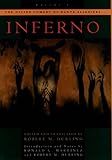All Categories
Purgatorio: The Divine Comedy of Dante Alighieri, Vol. 2
Share Tweet
Get it between 2024-05-14 to 2024-05-21. Additional 3 business days for provincial shipping.
*Price and Stocks may change without prior notice
*Packaging of actual item may differ from photo shown
- Electrical items MAY be 110 volts.
- 7 Day Return Policy
- All products are genuine and original
- Cash On Delivery/Cash Upon Pickup Available








About Purgatorio: The Divine Comedy Of Dante
Product Description In the early 1300s, Dante Alighieri set out to write the three volumes which make the up The Divine Comedy. Purgatorio is the second volume in this set and opens with Dante the poet picturing Dante the pilgrim coming out of the pit of hell. Similar to the Inferno (34 cantos), this volume is divided into 33 cantos, written in tercets (groups of 3 lines). The English prose is arranged in tercets to facilitate easy correspondence to the verse form of the Italian on the facing page, enabling the reader to follow both languages line by line. In an effort to capture the peculiarities of Dante's original language, this translation strives toward the literal and sheds new light on the shape of the poem. Again the text of Purgatorio follows Petrocchi's La Commedia secondo l'antica vulgata, but the editor has departed from Petrocchi's readings in a number of cases, somewhat larger than in the previous Inferno, not without consideration of recent critical readings of the Comedy by scholars such as Lanza (1995, 1997) and Sanguineti (2001). As before, Petrocchi's punctuation has been lightened and American norms have been followed. However, without any pretensions to being "critical", the text presented here is electic and being not persuaded of the exclusive authority of any manuscript, the editor has felt free to adopt readings from various branches of the stemma. One major addition to this second volume is in the notes, where is found the Intercantica - a section for each canto that discusses its relation to the Inferno and which will make it easier for the reader to relate the different parts of the Comedy as a whole. Review 'This new edition of Inferno is distinctly user-friendly....Serious students-in or out of the classroom-who...examine the original poem alongside a readable and reliable prose translation will find this edition excellently suited to their needs.' -The Christian Science Monitor 'A useful volume for students and first-time visitors to Dante's cosmos.'- Publishers Weekly 'In this new translation, Durling tries to be as concrete as possible, producing a version that is more fluent and accurate than the versions of Mandelbaum and Musa.... Highly recommended.' -Library Journal 'Like the Inferno edition that preceded it, the Durling-Martinez Purgatorio, with its beautiful translation and superb apparatus of notes, is simply the best edition of Dante's second canticle in English. No other version offers anything close to what we find gathered here in one volume.' -Robert Harrison, Professor of Italian, Stanford University "As Durling and Martinez complete their monumental three-volume presentation of Dante's masterpiece, we can sense their triumph and elation, despite their characteristic modesty. This, after all, is the volume with which they can demonstrate the fullness and consistency of Dante's great project, its final approach to what they describe in one footnote as 'a pitch of intensity unique in all literature.' The scholarship, as always, is graceful, comprehensive, and acute, and it surrounds a translation that is so carefully considered and fully realized as to be, at times, quite breathtaking." --David Young, translator of The Poetry of Petrarch "Durling and Martinez deliver Paradiso in elegant English prose faithful to Dante's Italian. The general introduction and succinct notes to each canto enable an informed reading of a frequently daunting text, while the longer 'Additional Notes,' bibliography, and indices will more than satisfy the most exigent critic. Marvelous, in the richest medieval sense of the term." --Michael Wyatt, author of The Italian Encounter with Tudor England "At the end of his poem Dante claims that his 'high imagining failed of power,' but Durling and Martinez have suffered no such fate in completing their translation of the Divine Comedy. Their Paradiso is a crowning achievement, a work of lucid prose and of impeccable accuracy. Readers will find themsel


















